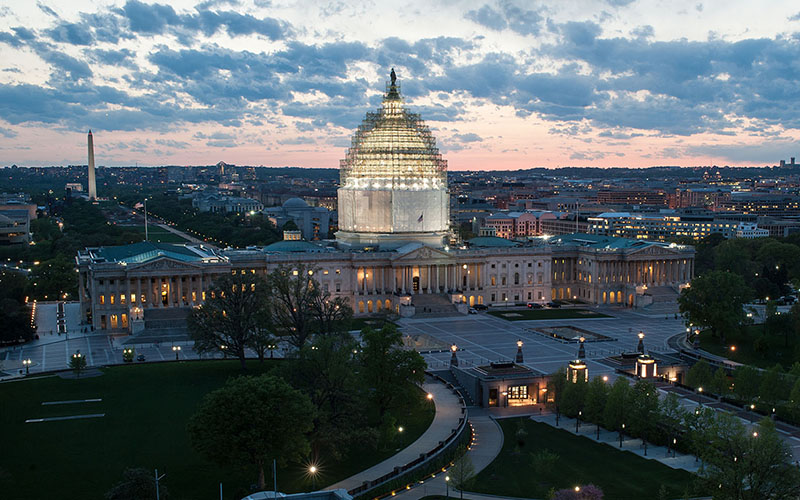
The East Front of the U.S. Capitol at dusk. It’s quiet now, but will be a lot livelier when Congress returns from its August recess on Sept. 8 and begins to tackle a long list of backed-up legislation. (Photo courtesy Architect of the Capitol)
WASHINGTON – When Congress returns Tuesday from a five-week vacation, its members had better be rested.
They face a laundry list of issues, ranging from a vote on the Iran nuclear deal to a possible Planned Parenthood funding fight to gun control – not to mention the “elephant in the room,” passage of a federal budget by Sept. 30 to avoid a government shutdown.
While it’s not uncommon for lawmakers to put a long to-do list off until the last minute, Congress watchers say this year brings the added element of a number of presidential hopefuls in the Capitol who might be looking to make headlines rather than meet deadlines.
“It’s going to be a circus because it always is at this time, and it’s even worse now” because of the 2016 campaign, said Marge Baker, executive vice president of People for the American Way. She said Republicans in the Senate who are running for president might use the threat of shutting down the government to their advantage.
The budget is the thread that connects many of the issues facing Congress when it returns from its August recess. Some lawmakers are likely to try to tack amendments on to a budget bill in hopes of forcing a vote on their issues or threaten a shutdown of the government if no new budget is passed.
First on the calendar is the Iran nuclear deal, a multination agreement that the White House said will significantly reduce Iran’s ability to develop its nuclear capabilities in exchange for easing trade and financial sanctions against the country. Congress has until Sept. 17 to vote it up or down – it cannot amend the plan – and the House is scheduled to begin debate next week on a resolution opposing the deal.
But even if Congress votes it down, President Barack Obama has already secured enough votes to uphold a veto if he has to issue one, said Kyle Kondik, managing editor of Sabato’s Crystal Ball at the University of Virginia Center for Politics.
A week after acting on the Iran deal, lawmakers will meet for an address by Pope Francis, the first time a pope has addressed a session of Congress. A week after that, the deadline to pass a fiscal 2016 budget will be looming.
Both Kondik and Lisa Gilbert, director of Congress Watch for Public Citizen, talked about the potential threat of a government shutdown should the budget stall. Gilbert specifically pointed to threats by critics to use the budget to defund Planned Parenthood, saying it would be “outrageous” to shut down the government to attack a service that she said provides health benefits to millions of women.
“Hopefully that is just rhetoric,” Gilbert said of the Planned Parenthood funding threats,
But Kondik said it might be “good politics” for the presidential hopefuls in the Capitol to to shut down the government – that for someone like Sen. Ted Cruz, R-Texas, making Congress run smoothly might not be the main goal.
Congress can avoid a shutdown by passing a continuing resolution, which allows government to continue operating at levels under the previous fiscal year’s budget until a new budget is passed.
Whether they come to pass or not, the shutdown threats show that the 2016 elections are already starting to have an impact, the experts said. Elections are getting “ever longer,” Gilbert said, and there is chance that candidates will try and accomplish and block certain policies for their political resumes.
In addition to looming issues, there are left-over ones for Congress to deal with.
Lawmakers failed to act this summer to reauthorize the Export-Import Bank, whose authorization expired June 30. The congressionally authorized bank “provides trade financing solutions … to empower exporters of U.S. goods and services,” according to its website, but critics say it amounts to little more than “corporate welfare program.”
Gilbert said the debate over the program, which is backed by many business interests, shows a “real schism in the Republican Party.”
Gilbert said this sort of long to-do list is not unusual for lawmakers at this time of year, and Kondik noted that, “Congress tends to meet deadlines at the last minute.”
“Whether or not you call that productive … is in the eye of the beholder,” he added.
– Cronkite News reporter Elizabeth Blackburn contributed to this report.